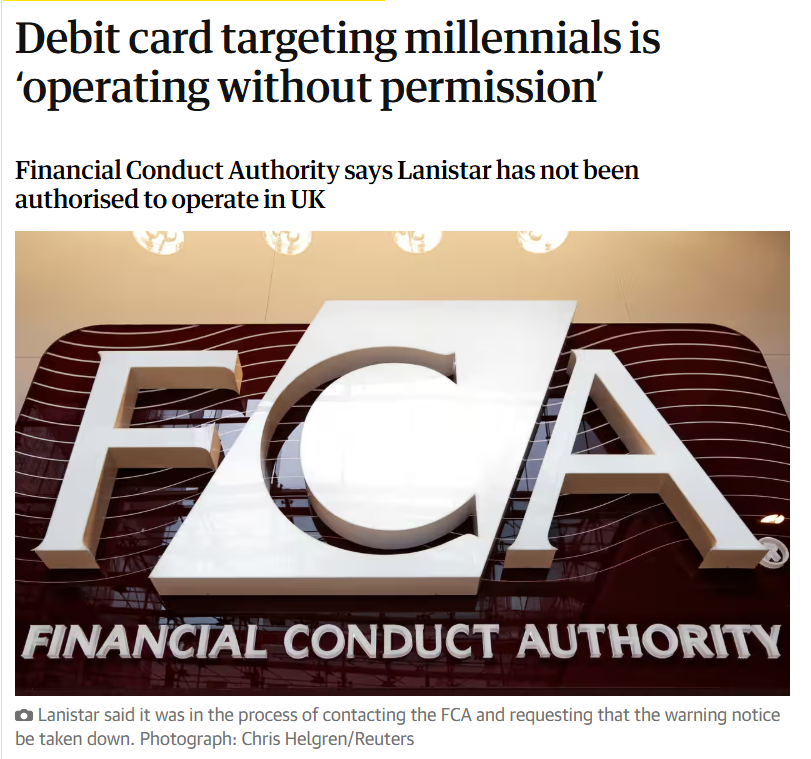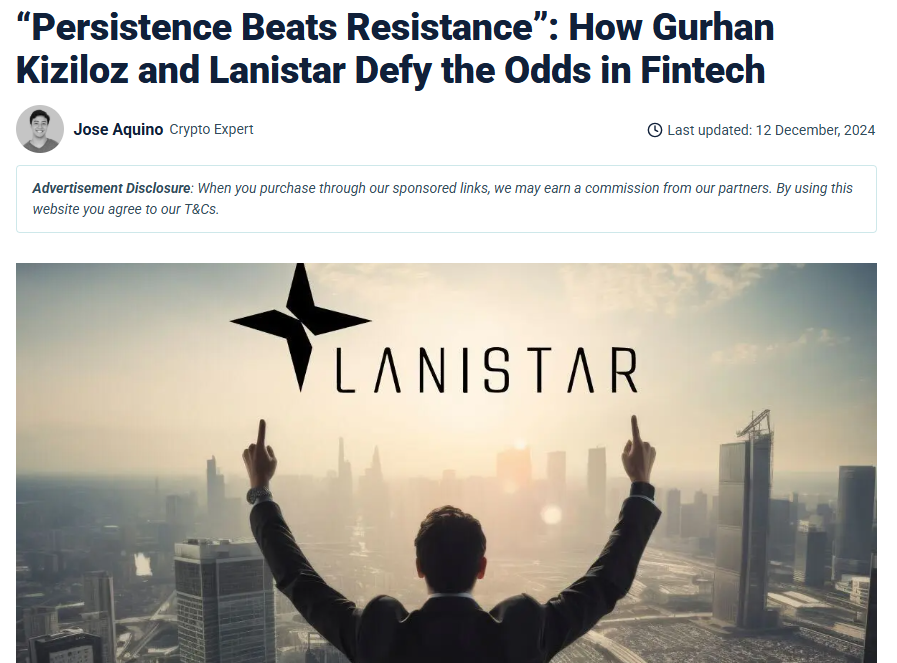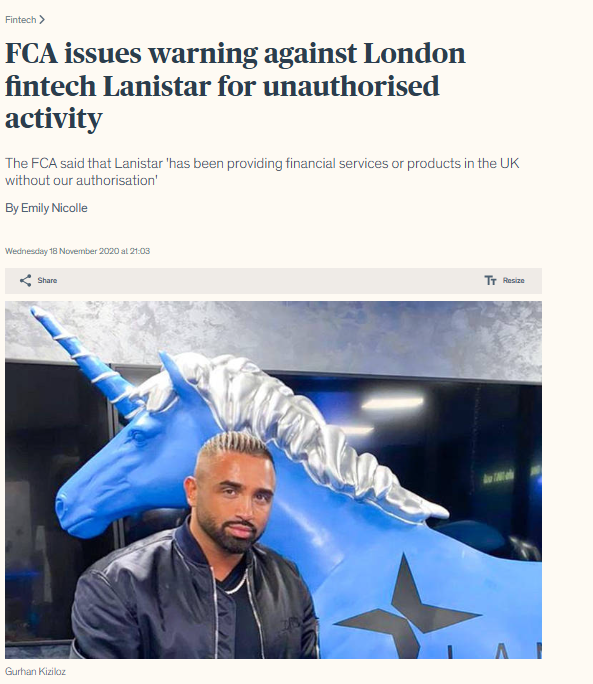In the fast-paced world of financial technology, where innovation often outpaces regulation, London-based fintech startup Lanistar has found itself in hot water. The company, once heralded as a potential billion-euro enterprise, has been accused by the UK’s Financial Conduct Authority (FCA) of offering unauthorized financial services. The FCA’s warning, which even raised the possibility of Lanistar being a scam, has cast a shadow over the startup’s ambitious plans and its high-profile marketing campaigns. This incident serves as a stark reminder of the importance of regulatory compliance in the fintech industry, particularly for young companies aiming to disrupt established markets.
The Rise of Lanistar: A Fintech with Big Dreams
Lanistar, founded by young entrepreneur Gurhan Kiziloz, emerged on the fintech scene with bold promises and a vision to revolutionize the financial services industry. Launched with the goal of becoming Europe’s next unicorn—a startup valued at over one billion euros—Lanistar positioned itself as a game-changer in the crowded fintech landscape. The company’s flagship product, a debit card touted as the “world’s most secure card,” was designed to appeal to a younger, tech-savvy demographic, particularly millennials and Gen Z travelers.
Kiziloz, a charismatic and ambitious leader, was quick to promote Lanistar’s potential. In a May interview with Forbes, he confidently declared that Lanistar would not only compete with but surpass other fintech startups. “We are tapping into an untouched market,” he said, hinting at proprietary “polymorphic technology” that would set Lanistar’s debit card apart from competitors. The card, he claimed, was tailored for the lifestyle of young professionals who might jet off to Dubai or Mykonos for a weekend and return to work on Monday morning. This vision resonated with a generation accustomed to seamless digital experiences and global mobility.
To amplify its brand, Lanistar launched an aggressive marketing campaign, including a 3000-person influencer initiative that generated significant buzz on social media. The campaign positioned Lanistar as a trendy, forward-thinking company poised to disrupt traditional banking. Major media outlets, including The Mirror, covered the startup’s plans, with some reporting that Lanistar was building a team of 400 employees to support its growth. The company also secured a high-profile partnership with Mastercard, the world’s second-largest payments processor, which praised Lanistar’s “game-changing” debit card product.
Scott Abrahams, Mastercard’s senior vice-president of business development and fintech, expressed optimism about the collaboration, stating, “The team has created a unique product through its polymorphic technology, and we look forward to seeing them launch later this year.” This endorsement from a global financial giant lent Lanistar significant credibility and fueled its narrative of hypergrowth.
The FCA’s Warning: A Regulatory Roadblock
Despite its early successes, Lanistar’s trajectory took a dramatic turn when the FCA issued a public warning about the company’s operations. The regulator accused Lanistar of providing financial services or products in the UK without proper authorization, a serious violation under UK financial law. The FCA’s statement was unequivocal: “We believe this firm has been providing financial services or products in the UK without our authorization…. This firm is not authorized by us and is targeting people.”
The FCA went further, raising concerns that Lanistar’s activities could be linked to fraudulent schemes. “Some firms act without our authorization and some knowingly run investment scams,” the regulator noted, urging consumers to exercise caution. This warning was a significant blow to Lanistar, which had carefully cultivated an image of innovation and trustworthiness.
The FCA’s intervention highlighted a critical oversight in Lanistar’s strategy: the failure to prioritize regulatory compliance. In the UK, nearly all firms and individuals offering financial services or products must be authorized by the FCA. This requirement ensures that companies adhere to strict standards of consumer protection, transparency, and financial stability. By allegedly operating without authorization, Lanistar risked not only legal repercussions but also damage to its reputation and partnerships.

The Fintech Industry: A Balancing Act of Innovation and Regulation
Lanistar’s predicament is not unique in the fintech industry, where the drive for innovation often clashes with regulatory requirements. Fintech startups, fueled by venture capital and a desire to disrupt traditional banking, frequently push the boundaries of what is permissible under existing laws. However, regulators like the FCA are tasked with ensuring that these innovations do not compromise consumer safety or market integrity.
The FCA’s role in the UK is particularly significant, given the country’s status as a global financial hub. The regulator oversees thousands of firms, from established banks to emerging fintechs, and maintains a robust framework for licensing and supervision. For fintech startups, obtaining FCA authorization is a rigorous process that involves demonstrating compliance with anti-money laundering rules, data protection standards, and capital adequacy requirements, among others.
Lanistar’s failure to secure authorization before promoting its services highlights a common pitfall for young companies. Unlike non-regulated industries, where startups can launch products with minimal oversight, financial services require meticulous planning and adherence to legal standards. As Jason Bates, a co-founder of digital bank Monzo, noted on Twitter, “FS [Financial Services] product launches are very different from non-regulated apps.”
Bates, whose experience with Monzo and Starling Bank gives him deep insight into the fintech sector, expressed sympathy for Lanistar’s team. He acknowledged that the company had secured reputable partners, including Visa, Global Processing Services (GPS), and Jumio, which hold licenses to offer e-money and prepaid card services. However, he criticized Lanistar’s approach to its launch, pointing out that regulatory compliance should be a top priority. “The original Starling and Monzo landing pages probably had as much effort put into the footer (regulatory information and a clear description of what was being offered) as the rest of the page,” Bates remarked. “You just can’t bypass that.”

Lessons from Lanistar’s Misstep
The Lanistar case offers several lessons for fintech entrepreneurs and investors. First and foremost, it underscores the importance of engaging with regulators early in the product development process. Startups must conduct thorough due diligence to ensure that their business models comply with local laws and regulations. This is particularly critical in jurisdictions like the UK, where the FCA maintains a proactive stance on consumer protection.
Second, the incident highlights the risks of overhyping a product before it is ready for market. Lanistar’s aggressive marketing campaign, while effective in generating buzz, may have contributed to the FCA’s scrutiny. By promoting its debit card as a revolutionary financial product without proper authorization, Lanistar inadvertently invited regulatory attention. Fintech startups must strike a balance between building excitement and ensuring that their claims are substantiated and legally compliant.
Third, partnerships with established players like Mastercard, while valuable, do not exempt startups from regulatory obligations. Lanistar’s collaboration with Mastercard lent it credibility, but it did not absolve the company of the need to obtain its own FCA authorization. Startups must understand the scope of their partners’ licenses and ensure that their own activities fall within the bounds of those licenses.
Finally, the Lanistar case illustrates the importance of transparency in financial services. Consumers and regulators expect clear and accurate information about the nature of a company’s products and its regulatory status. Lanistar’s failure to provide this information upfront may have contributed to the FCA’s concerns about potential scams.
The Broader Context: Fintech Regulation in the UK
The FCA’s warning to Lanistar comes at a time when the UK is grappling with the broader challenges of regulating the fintech sector. The country has long been a leader in fintech innovation, with companies like Revolut, Monzo, and Wise achieving global success. However, the rapid growth of the sector has also raised concerns about consumer protection, financial crime, and market stability.
In recent years, the FCA has intensified its oversight of fintech firms, particularly those offering novel products like cryptocurrencies, peer-to-peer lending, and digital wallets. The regulator has also introduced initiatives to support innovation, such as the Regulatory Sandbox, which allows startups to test new products in a controlled environment. However, these programs are not a substitute for full authorization, and firms must still meet stringent requirements to operate legally.
The Lanistar case may also reflect broader tensions between regulators and fintech startups. While regulators aim to protect consumers and maintain market integrity, startups often view compliance as a barrier to innovation. This dynamic can lead to misunderstandings and conflicts, as seen in Lanistar’s case. To bridge this gap, fintech firms must invest in legal expertise and build strong relationships with regulators.

The Road Ahead for Lanistar
For Lanistar, the FCA’s warning represents a significant setback, but it is not necessarily the end of the road. The company’s prompt response and willingness to engage with the regulator suggest a commitment to resolving the issue. If Lanistar can secure FCA authorization and address the regulator’s concerns, it may still achieve its ambitious goals.
However, the incident has likely damaged Lanistar’s reputation, particularly among consumers and potential partners. Rebuilding trust will require transparency, accountability, and a clear demonstration of compliance. The company may also need to reassess its marketing strategy to ensure that future campaigns align with regulatory requirements.
Lanistar’s experience serves as a cautionary tale for other fintech startups. While ambition and innovation are essential for success, they must be tempered with a deep understanding of the regulatory landscape. In the high-stakes world of financial services, there is little room for error, and the consequences of non-compliance can be severe.
Conclusion
Lanistar’s clash with the FCA highlights the challenges of balancing innovation and regulation in the fintech industry. The company’s bold vision and high-profile partnerships were not enough to shield it from regulatory scrutiny, underscoring the importance of compliance in financial services. As Lanistar works to address the FCA’s concerns, its experience offers valuable lessons for other startups navigating the complex world of fintech. By prioritizing regulatory compliance, engaging with regulators early, and maintaining transparency, fintech firms can avoid the pitfalls that have befallen Lanistar and build a foundation for long-term success.







